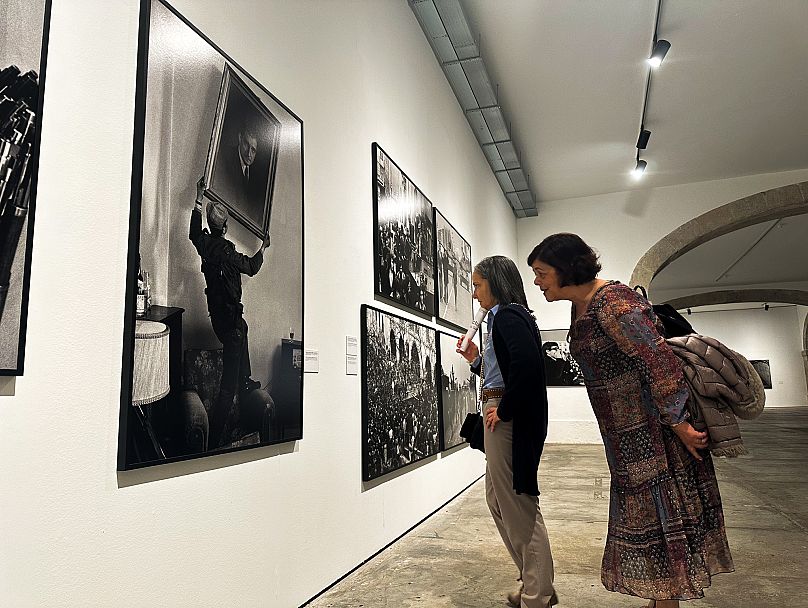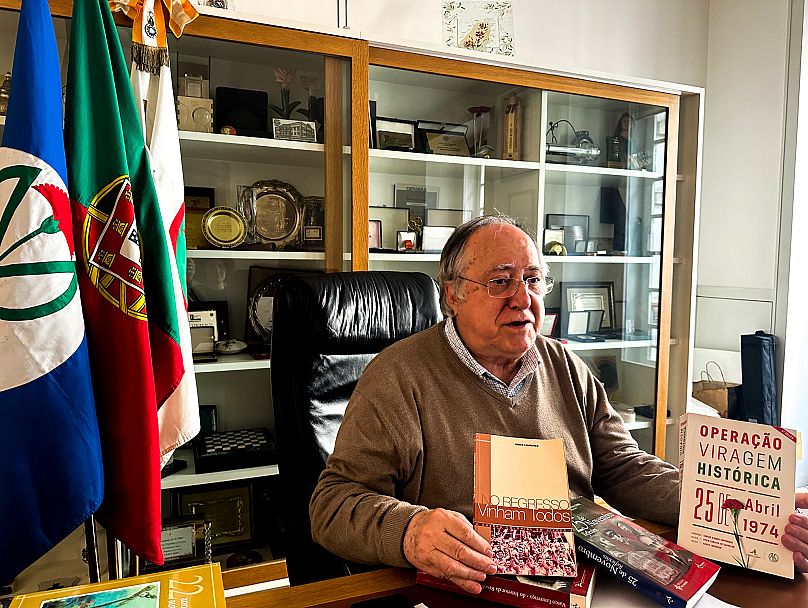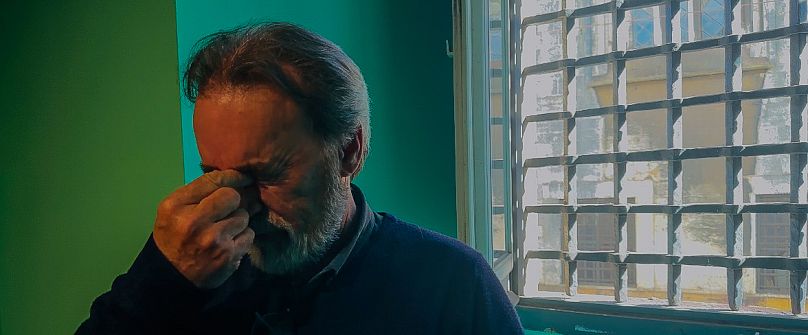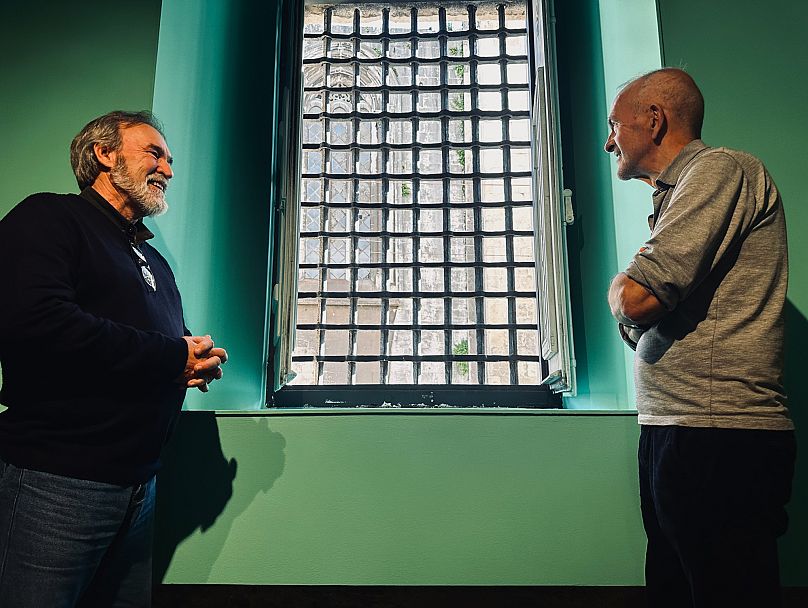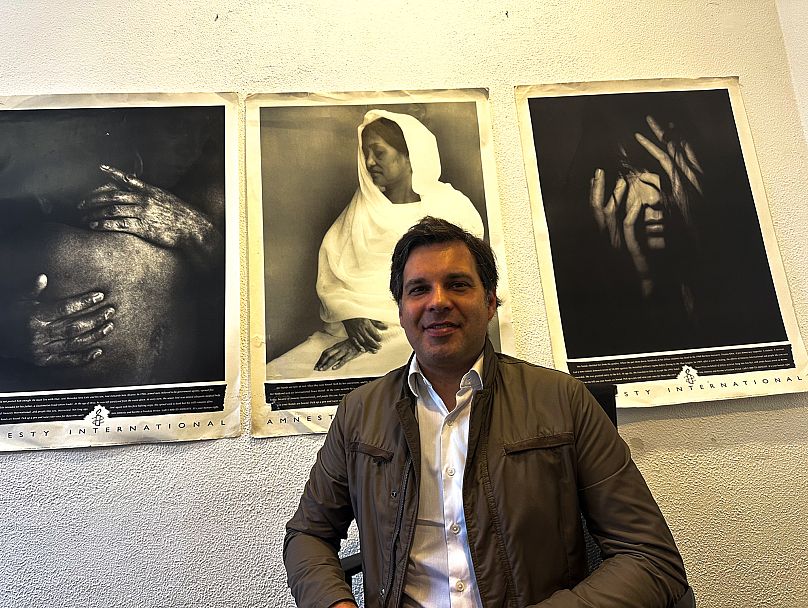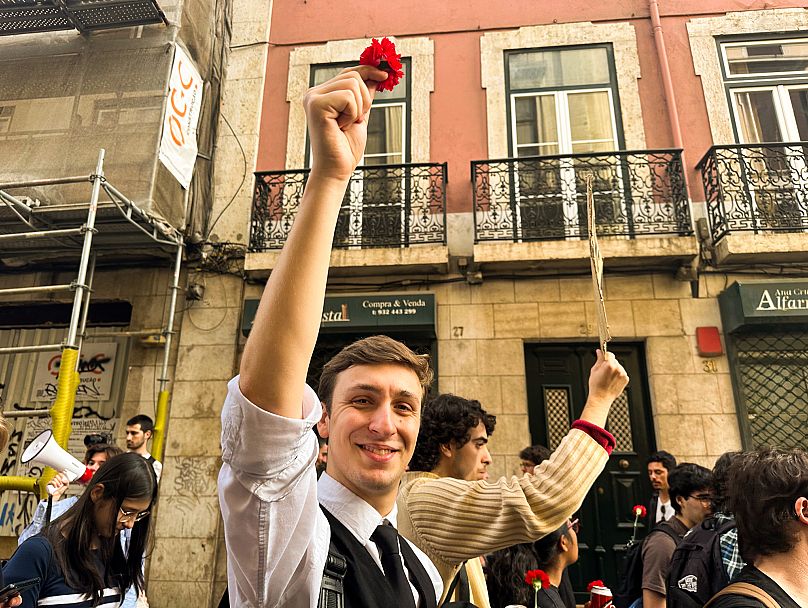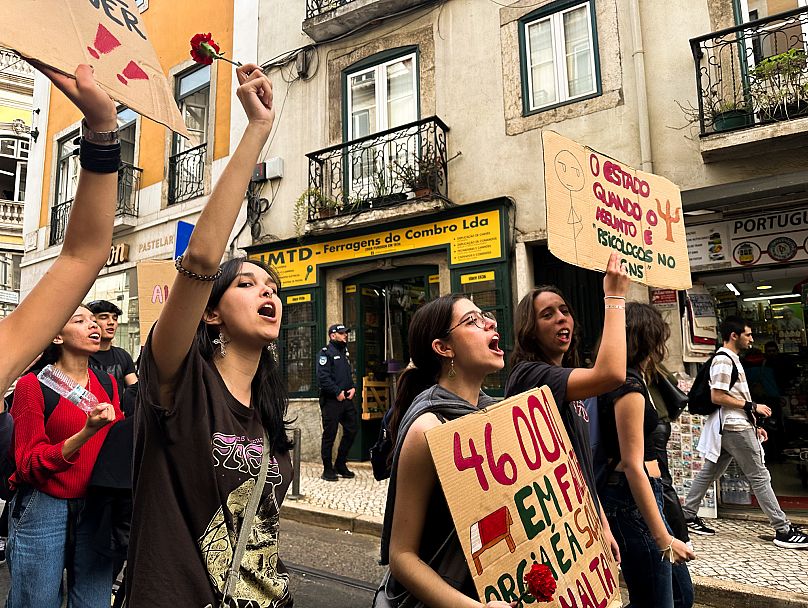25 April, 2024, marks the 50th anniversary of Portugal's Carnation Revolution. It ended about 41 years of dictatorship and began an era of democracy. The milestone is celebrated as the political landscape shifts, with the centre-right winning recent elections and the far-right gaining ground.
"In 1974, I was 18 and beginning my university studies in Lisbon. However, on 25 April, I found myself in Porto, seeking the tranquility of family to study. We sensed that something significant was happening, and my mother advised me to stay indoors." Now 68, Maria Gorete shares her stories with Euronews. We met her on the morning of 22 March in one of the municipal galleries of the Portuguese capital. Her eyes sparkle with a special gleam as she recalls the days of chaos and ecstasy that Portugal experienced during the Carnation Revolution.
 ADVERTISEMENT
ADVERTISEMENT
 ADVERTISEMENT
ADVERTISEMENT
When asked about her plans for its 50th anniversary, Maria gets excited: "It's going to be a memorable day! We have plans to meet 30 former university classmates to celebrate." "As for me, I've kept a bottle of port from 1974. I can't wait to open it this 25 April," shares Adozinda, a friend of Maria's. At the time, she was 15 and living in Angola, a former overseas province of Portugal.
The two women admire the exhibition by photographer Eduardo Gageiro. Among them, a military parade, a Portuguese soldier removing a portrait of the dictator António de Oliveira Salazar from the headquarters of the PIDE (secret police), and young people looking jubilant around a tank. In the vast, silent gallery of the Cordoaria Nacional, an old ropeworks on the banks of the Tagus, we are plunged back into the past, while outside, Lisbon basks in the light and warmth of a spring day.
We are just over a month from the 50th anniversary of the revolution that ended the Salazar dictatorship. António de Oliveira Salazar became Prime Minister of Portugal in 1932. He established a dictatorship by limiting civil liberties, imposing strict censorship, and repressing all political opposition.
Salazar was replaced by Marcelo Caetano in 1968. Caetano attempted to modernise the regime while maintaining its authoritarian structure and continuing the colonial wars in Africa, which led to a coup and the end of the dictatorship in 1974.
By 25 April, 1974, the Portuguese Army, backed by civilians, had grown tired of and outraged by the horrors of the colonial wars in Angola, Mozambique, and Guinea-Bissau. They decided to change course. "We didn't yet understand what was happening; we only knew that soldiers were being killed, and we were afraid," explains Maria Gorete. "It wasn't until 1 May that we finally understood: we were free! What euphoria! Everyone took to the streets to celebrate," she adds.
The adoption of the Constitution in 1976 laid the foundations for a pluralistic democracy. Since then, the Portuguese political landscape has alternated between governments of the centre-left Socialist Party (PS) and the centre-right Social Democratic Party (PSD).
On 10 March, 2024, the Portuguese people turned another significant page in their history. After eight years of socialist government, the legislative elections saw the centre-right opposition emerge victorious, and the far-right Chega party gain 18% of the vote, up from 7.2% in the previous legislative elections of January, 2022. The party headed by André Ventura has a manifesto based on transphobic and xenophobic stances, among others, with an especially strong opposition to immigration. "We fought this fight so that our children and grandchildren could be free. And now, my grandson, armed with this freedom, chooses to use it to vote for the right. I plan to take him to see this exhibition, to remind him that if he can freely express his choice today, it's thanks to our struggle," explains Maria Gorete.
A shift to the right
Vasco Lourenço, now in his 80s, was just 31 in 1974. As a captain in the Portuguese army, he orchestrated the first clandestine meeting aimed at overthrowing the regime. This gathering in Alcáçovas, southern Portugal, took place on 9 September, 1973. It brought together 95 captains, 39 lieutenants, and two officers, marking the first step toward the coup and the revolution. “The values that pushed us, so to speak, and motivated us to revolt on 25 April, 1974, I think those values have remained in Portuguese society, which has allowed us to have 50 years of democracy. But there are no perfect democracies,” he tells me. “I think it's clear that a party like this [Chega] is not democratic at all. It's using democratic rules to come to power, but history tells us that if they come to power, they will try to end democracy. And therefore we have to fight them, fight them within democratic rules,” he adds with conviction.
Lourenço proudly hosts us at the April 25 Association, which he presides over. He's surrounded by hundreds of veterans' medals. His involvement in the war in Guinea-Bissau in 1969 and the loss of a comrade have made a profound mark on him. “Upon my return, I resolved never to take up arms again. I would have deserted if necessary,” he explains. “But I also felt anger at myself. I realised what I hadn’t understood before leaving: I was the instrument of an illegitimate power in Portugal, a regime of dictatorship, repression. I then decided to use my military status to overthrow this regime.”
While the army was organising to overthrow the dictatorship, less visible figures were spreading anti-regime propaganda among the Portuguese diaspora from abroad. Among them, Arnaldo Silva.
“My rebellion started when I was just 12 or 13 years old. By 1969, I was involved in political struggle against the regime.” His activism led to his arrest on 2 December, 1971. He was 18. “That morning, as I was preparing to go to work, two agents burst in and arrested me,” he recalls. Imprisoned in Caxias, west of Lisbon, he says he was immediately subjected to violence. "The torture endured, the forced sleepless nights, the administered sedatives…" Silva pauses, overwhelmed by emotion, covering his eyes and trying to hold back tears as he describes his detention in a tiny square cell shared with four inmates.
Banned from all political activity in Portugal after his detention, Arnaldo Silva went into exile in France.
In a dimly lit room of the Aljube Museum, a former prison in Lisbon, Arnaldo is joined by José Martins, also a former political prisoner who lived in exile in France. “I think the rise of the far right in Portugal is mainly due to some failures of left-wing governments, which failed to address the concerns of the people,” he estimates. “Those who vote right are often those who were once left and switched sides because the left failed to solve social problems.”
Those social issues were among the priorities of Amnesty International in Portugal during the 2024 electoral campaign. Aware of the significant human rights advancements post-revolution and concerned about their future, the NGO issued a set of recommendations to all political parties. The organisation’s concerns included education, the state of the Portuguese health system, and access to housing.
“The topics that really concern us: the use of migrants and refugees as scapegoats to scare the population and win votes,” specifies Pedro A. Neto, Amnesty International, Portugal's Executive Director.
Neto notes: “Racism exists. Often, it manifests in very informal ways, in coffee shop discussions or on social media, where people speak ill just for the sake of it. The difference with Chega is that it capitalised on this racism to make it official discourse. It has normalised this kind of discourse, which is completely disrespectful".
Facing the rise of the far right, historian and professor Ricardo Noronha at the Nova University of Lisbon provides further perspective: “It seems to me that the broad notion of democracy, as a set of individual and collective rights, is not threatened by the fact that the far right secured 18% of the vote in the last elections.”
The Revolution's echo among the younger generation
In the lead-up to the anniversary of this historic revolution, the April 25th Governmental Commission is making significant efforts to engage all age groups in this act of remembrance, especially the youth. This challenge is considerable, given that, according to initial polls, 41% of young, less educated men voted for Chega. "We've launched campaigns on social media, which are highly followed by young people, such as the one titled #YouCouldNot, listing 13 prohibitions and restrictions before the revolution, like the inability to vote freely or to organise politically," explains Maria Inácia Rezola, executive commissioner and history professor. These initiatives aim to raise awareness about the freedoms now taken for granted, which were once unattainable.
"Freedom is like health: its importance is only realised when we start to lose it," remarks Vasco Lourenço. "It's natural for those born into freedom not to question their state. I often ask if they would accept living without freedom, and the response is unanimously negative. Yet, it's crucial to remain vigilant since human history is cyclical, and we must not allow freedom to be threatened again. We must learn from history to prevent the youth from being alienated once more," he asserts.
According to Arnaldo Silva, "the Portuguese youth remains alert and will refuse to let political, economic, or military ambitions override their freedoms and ideals."
Professor Ricardo Noronha confirms the young generation's evident interest in this historical period. "When we visit high schools or elementary schools, the students' enthusiasm is palpable. Contrary to expectations, they remain attentive, ask questions, and share their thoughts, sometimes influenced by familial narratives of the era. This curiosity signifies a healthy engagement," he observes.
On 25 April, Portuguese unions and protest movements traditionally march to make their voices heard. This year, the momentum began well in advance, driven by the Portuguese youth. In the alleys of Lisbon, during a protest against financial instability, they chant "25 de abril sempre, fascismo nunca mais!" (25 April forever, fascism never again!). With fists raised they hold the symbolic red carnation, the flower placed in gun barrels in 1974 as a symbol of peace. For these young people, the spirit of the revolution seems to still be very much alive.











